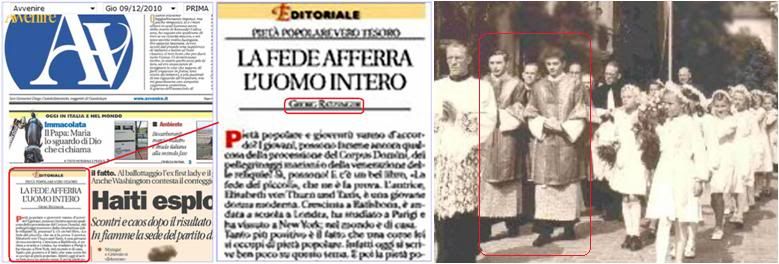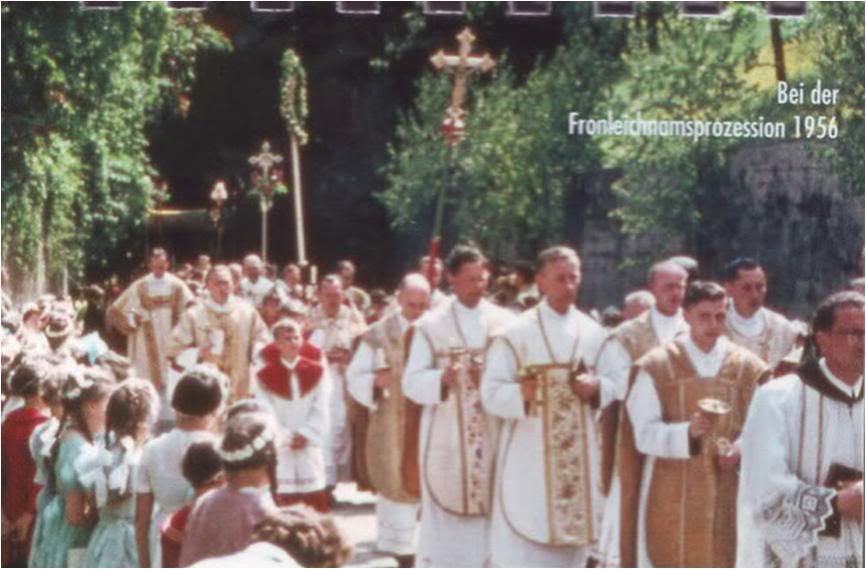 The Dec. 9 issue of Avvenire, the newspaper of the Italian bishops' conference, unusually features a Page 1 editorial by the Pope's brother, Mons. Georg Ratzinger. No, he has not turned guest writer for them, but the editors decided to use a Preface that he wrote for an editorial on a subject that is often marginalized in our day, as Mons. Ratzinger himself observes.
The Dec. 9 issue of Avvenire, the newspaper of the Italian bishops' conference, unusually features a Page 1 editorial by the Pope's brother, Mons. Georg Ratzinger. No, he has not turned guest writer for them, but the editors decided to use a Preface that he wrote for an editorial on a subject that is often marginalized in our day, as Mons. Ratzinger himself observes.
 Right photo: Georg and Joseph Ratzinger, in July 1951, walking to the Church where they were to say their first Mass at the parish church of Traunstein, in a traditional procession in which the town joins in.
The Pope's brother and
Right photo: Georg and Joseph Ratzinger, in July 1951, walking to the Church where they were to say their first Mass at the parish church of Traunstein, in a traditional procession in which the town joins in.
The Pope's brother and
the faith of the little folk
by Gianni Cardinale
Translated from

Dec. 9, 2010
The brief but intense words below in praise of popular piety or folk religion was written by Mons. Georg Ratzinger, who will turn 87 on January 15 (three years older than his brother the Pope), as the Preface for a booklet published by the Vatican publishing house,
La fede dei piccoli: Un invito appassionato e convincente a vivere di nuovo la fede cattolica con i cinque sensi (The faith of the simple folk: A passionate and persuasive invitation to live the Catholic faith anew with all five senses) [LEV, 2020, 120 pp), by Princess Elisabeth von Thurn und Taxis (daughter of Gloria), with an Afterword by Mon. Wilhelm Imkamp.
The book will be presented in Rome tomorrow evening by the author at the Vatican bookstore, Libreria Internazionale Paolo VI, located in the headquarters of Propaganda Fide in Piazza di Spagna.
Along with his brother, Mons. Ratzinger, who was Domkapellmeister and director of the Regensburg Domspatzen from 19641994, will celebrate 60 years of priesthood next year. They were ordained on June 29, 1951, in teh Cathedral of Freising.
Faith engages the whole man
by Georg Ratzinger
Translated from

Dec. 9, 2010
Can young people still be interested in the procession of Corpus Domini, in Marian pilgrimages or the veneration of relics?
Yes, they can. And there's a beautiful book,
La fede dei piccoli, which proves it. The author, Elisabeth von Thurn und Taxis, is a young modern woman, who was raised in Regensburg, educated in London and Paris, and lived some time in New York. She is at home in the world.
Thus it is all the more positive that someone like her takes an interest in popular piety. Indeed, hardly anyone writes of it these days. Besides, popular piety has been, in a certain way, marginalized compared to liturgical piety.
The latter is, of course, very important. But formal piety needs to be completed by popular piety, which many today consider with an attitude of haughtiness.
But why does popular devotion belong in a primal way to our faith? The answer is simple: those elements that are particularly beautiful in the Catholic faith are those that engage our senses.
Our faith is not limited to prayer, interiority and rationality. Faith engages the entire person. All of man is called to holiness, and so he ought to cultivate it actively with all his senses.
Many priests aspire to be 'modern', 'in step with the times', as the sayings go. They believe that popular piety is a thing of the past, and step by step, they have been expelling it from the Church.
Protestantism long abandoned this form of piety. For the evangelical Christians, a church is present only where they can pray and where sacraments are administered. But they forget that the Church is a reality that is always present because it fills all of our life and aims to involve us integrally into the life of the Church.
Unfortunately, a similar tendency has started to take hold even among Catholics. But we can also note that wherever only 'rational religion' is practised, faith loses its strength and will disappear sooner or later.
Faith is not only rational - it also needs simple and true expressions that have been present from the start and of which men has need. For us Christians, these expressions are fundamental.
Popular piety is a treasure of the Church. Therefore, it is all the more important to oppose well and properly any notions of doing away with it. I say this thinking precisely of young people. We would realize all too soon what we have lost if we can no longer 'touch our faith with the hand', if the faith ceases to engage the whole man.
In Bavaria, my homeland, popular piety has always played an important role. To Bavarians, the purely rational element is perhaps less important. For us, what matters most is what we can perceive with the senses. That is why, in Bavaria, popular piety has a special place in the religious life of every person.
Of course, because of great individual mobility today, it has become more difficult to keep these precious traditions alive. Nonetheless, the more frenetic life becomes, the more men need to fall back on their own rites and customs.
That is why it is so important that popular piety continues to be cultivated and nourished with enthusiasm, so that even future generations will benefit.
Faith remains alive only if it engages the whole man. This is the message that i wish to address to young Christians today. That is why I am particularly happy that a young modern woman and writer, who wants to make her generation know and get to love folk piety, shows in her book that it brings us closer to Jesus Christ.
Having been steeped in popular piety myself, derived by us Filipinos from the rich folk Catholicism of Spain - very much akin to Bavarian rococo Catholicism - I particularly appreciate this aspect of spirituality. So, I think the following brief addendum is useful to complement Mons. Ratzinger's Preface:
When Benedict XVI addressed the Fifth General Assembly of Latin American and Caribbean bishops in 2007 in Aparecida, Brazil, he praised and upheld popular piety as "the soul and precious treasure of the peoples of Latin America," asking the bishops to promote these authentic expressions of the Catholic faith as another place of encounter with Jesus Christ, a school of spirituality.
The bishops' final document later described some of the main expressions of this spirituality: feasts, novenas, rosaries, processions, pilgrimages, shrines, love of the saints, personal intimacy with Jesus and Mary, and home altars. It describes popular spirituality as "a distinctive form of Christian spirituality - an encounter with the living Lord which integrates the corporal, the sensual, the symbolic, and the deepest needs of the person and the community".
 Young Fr. Joseph Ratzinger, second from right, in a 1956 Corpus Christi procession.
NB: The cover of the Princess T&T's book is not online yet. I do not know what's wrong with LEV, the Vatican publishing house, It has not updated its publication notices online since October
Young Fr. Joseph Ratzinger, second from right, in a 1956 Corpus Christi procession.
NB: The cover of the Princess T&T's book is not online yet. I do not know what's wrong with LEV, the Vatican publishing house, It has not updated its publication notices online since October.
[Modificato da TERESA BENEDETTA 10/12/2010 01:11]